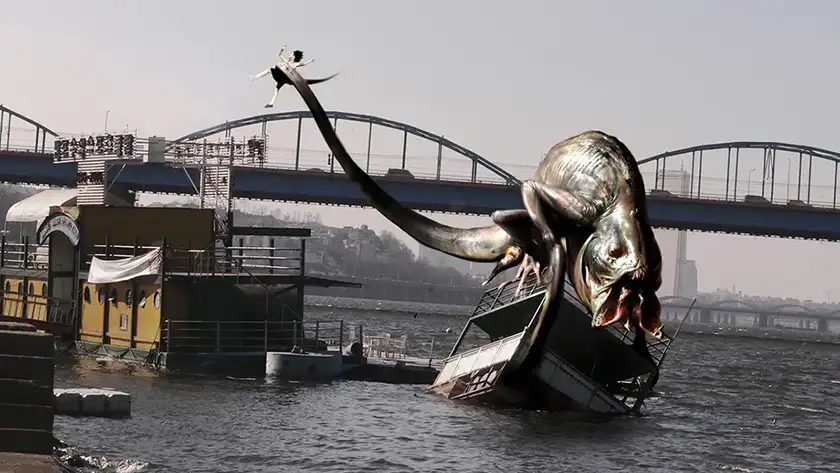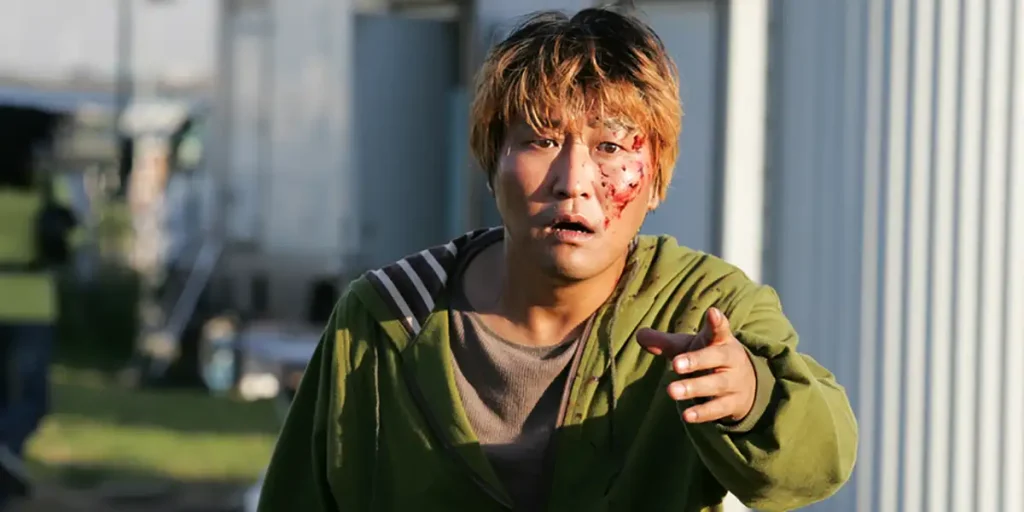The Host shows Bong Joon-ho playing with genre and tone to create a thematic, memorable monster movie with a focused aggression.
Director: Bong Joon-ho
Original title: Gwoemul
Genre: Horror, Monster Horror, Psychological Drama
Run Time: 120′
U.S. Release: March 9, 2007
U.K. Release: November 10, 2006
Where to Watch: On Shudder, on Digital & VOD
Bong Joon-ho is not known for being a subtle director. His works often wear their emotions and themes on their sleeves, and his 2006 monster movie The Host is no exception. A film about protecting family and the environment as much as it is about a giant fish creature, The Host is a genre-traversing thrill ride with simple but potent messaging.
The movie begins when an American scientist orders his Korean assistant to dump toxic chemicals down a drain leading into the Han River.
Right in this opening scene, several of The Host’s main ideas begin to take shape: Humanity (specifically governments and large corporations) are harming the environment with little to no regret. By the time the audience first witnesses the giant, fishlike monster — born from the chemicals — we understand exactly what Bong is doing. He does not try to hide his intentions, leaving everything up on the screen.
Some of the more B-level monster movies place shock value and thrills over other important storytelling elements like character. In The Host, however, the characters are not only fully realized, but they are also essential to the movie’s ideas. A regular in Bong Joon-ho’s films, Song Kang-ho plays Park Gang-du, a snack bar operator alongside his father (Byun Hee-bong). When the monster captures Hyun-Seo, Park’s daughter, and takes her underground, Park attempts to rescue her, leading to conflict with government forces and members of his own family. The struggles that go along with family dynamics is another idea Bong seems to wrestle with throughout the film. He portrays the harsh realities of differences and disagreements between family, but the ultimate resilience that results in close connection. Rather than focusing on the large-scale effects of environmental disaster, Bong zooms in to focus on how these disasters affect individuals. This focus adds an extra layer of resonance for the viewer.

Another idiosyncrasy of Bong’s films is his ability to blend genre and tone. While most would classify The Host is a monster movie, it’s easy to see there are other genres at play. His films strike a certain type of humor, leading some to classify his work, The Host included, as satirical comedy. I’ve already discussed how the film works as a family drama, as well. There are moments of seriousness and moments of levity sprinkled throughout, sometimes within the span of one scene. A scene where Nam-joo, Park’s sister, and the family visit a memorial when they think Hyun-Seo has been killed by the monster, blends comedy and serious elegy in uncomfortable but effective ways. This director holds an uncanny ability to make the tragic funny and to make the funny tragic. Many other filmmakers could try this technique and come out feeling jumbled, but Bong makes it seamless. He adds flavor to what could have been another gritty, yet one-dimensional creature feature.
Don’t let the comedy and genre blending fool you, though. The Host is an aggressive, confrontational film. The movie continually ups the ante, until the political allegory becomes too obvious to ignore. Towards the end, the government and the United States Forces Korea (USFK) releases “Agent Yellow,” a chemical meant to kill the monster, in reference to the very real Agent Orange, which has led to things like birth defects for those who have been exposed to it. Bong does not want to be misunderstood in his intentions: this film, and many of his others, are an attempt to vent frustration about how the powers that be treat the earth and even their own citizens. Even smaller creative decisions enhance his themes, like the way the water in the films starts out as blue before seemingly shifting to a sickly gray over the course of the film. All of these decisions lead to a 2000s monster movie with an extra dose of social commentary.
Movies about a potential virus, government corruption, and environmental catastrophe can clearly still remain relevant in today’s society, especially after the COVID-19 pandemic when people could have easily felt hopeless and discouraged. But, as The Host’s closing scene demonstrates, life goes on. Despite all of the political tension and world-changing events, events for which we have a right to be angry, what matters, Bong seems to say, is family. I find that to be a touching message, one that is often hard to find in a genre film such as The Host.
The Host: Movie Plot & Recap
Synopsis:
After toxic chemicals are dumped into the Han River in Seoul, South Korea, a giant fish-like monster emerges, wreaking havoc on the city. Park Gang-du, a young father working in the city, attempts to save his daughter after it kidnaps her and traps her in the sewers.
Pros:
- The movie balances humor, action, and sci-fi horror almost seamlessly.
- Bong’s direction elevates what could have been a basic monster movie by adding in different thematic layers.
Cons:
- The special effects for the monster itself have not aged particularly well, so viewers may find those visuals somewhat distracting.
- Audiences who prefer to deeply investigate a movie to unpack its themes may not fully appreciate the film’s obvious messaging.
The Host is now available to watch on Shudder, o digital and on demand.
Loud and Clear Reviews has an affiliate partnership with Apple, so we receive a share of the revenue from your purchase or streaming of the films when you click on some of the links on this page. This won’t affect how much you pay for them and helps us keep the site free for everyone.

